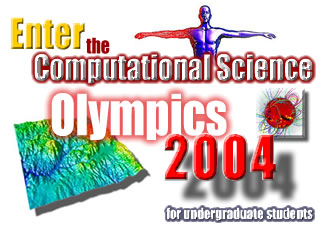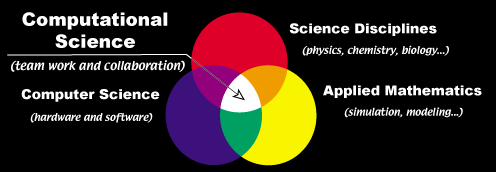 |

|

Enter the Computational Science Olympics for 2004
Due to changes in the EdCenter,
the Computational Science Olympics
will not be held after 2004. Thank you to all of our past participants!!!
Review Past Winning Entries
WHAT IS COMPUTATIONAL SCIENCE?
We view Computational Science as the intersection of three main academic disciplines:

Bioinformatics, computational physics and chemistry, geographic information science are examples of new exciting research fields that have gained strength in recent years. The San Diego Supercomputer Center (SDSC) supports demanding visualization, simulation, modeling, on-line analysis of large datasets, digital libraries, etc. We encourage you to develop your class projects or independent research projects so that they require a blend of your discipline-specific research and good computing, and submit them to the Computational Science Olympics for a review and (possibly) an award.
For example, the modeling and visualization of the body mechanics of the human knee or the motion of a roller coaster. But we would like to hear from you based on your own interests involving science and computing.
-
Revisit your recent projects that involved computers (beyond using a word processor to type up a term paper, obviously, or a web page of links to the work of other people). We are interested in your work, we want to reward your efforts to be creative.
-
Try to think about how creative use of computers helped you approach the solution more quickly and made the results more presentable. Whether you discovered a new phenomenon, or found a new way to demonstrate the known - we are interested in your approaches and results. CREATIVE THINKING IS WHAT COUNTS THE MOST!
-
Assemble a team of partners, though this is not necessary. For example, a biology senior develops a molecular science project in a class that could benefit from interactive data entry and visualization. This student might attend one of the computer club meetings of the ACM [Association for Computing Machinery] and talk with other students to see if they have ideas about how to extend and generalize the original molecular project.
-
Explore how others have used computational science tools in attacking various scientific problems. A good place to start would be the Ed Center's NPACI Showroom (npaci), a collection, by discipline, of a small subset of computing activities from the National Partnership for Advanced Computational Infrastructure (NPACI) (www.npaci.edu)
-
Contact us at the Ed Center to discuss your project ideas.
-
Take a look at the 2000 CSO Winning simulation and paper by Lena van der Stap and Patrick McNairnie "Simulation of the Contractile Behavior of an Isolated Cardiac Myocyte" from the Ed Center page (cso/cso1999.html).
-
Handling large data sets
-
Digital Libraries
-
Web-based information integration
-
3-D Visualization, specifically web-based
-
Advanced Numerical Simulation
-
Knowledge Discovery and Data Mining
Of course, you are not limited to these applications and approaches. Please contact us early if you have an intriguing application in mind that involves the use of modern high-performance computing techniques. Look at National Partnership for Advanced Computational Infrastructure (NPACI), The National Computational Science Alliance, (NCSA), and the Education Center on Computational Science & Engineering (EdCenter), to get the flavor of computational science approaches, methods, and applications we are interested in.
Any student enrolled in a degree-granting undergraduate course of study at any of California State Universities during 2003-2004 academic year is eligible. Team projects can be submitted (and are encouraged). At least 2/3 of the team should be undergraduate students, and the main author should be an undergraduate. Class projects are also encouraged.
We are looking for projects that demonstrate how creative, intelligent computing helps solve scientific and engineering problems, in various fields. On the formal side, your project submission should include:
-
A text description of the project (at least 8 pages, not including graphics) as an e-mail attachment sent to edcenter@sdsu.edu
-
A brief web page describing the project.
-
Software demonstration, in some appropriate form (linked to your Web page, if the software runs on the Web; a video of simulation experiments; visualization snapshots, or similar); please contact us (619) 594 0491 or edcenter@sdsu.edu for details.
The next CSO competition begins in Spring, 2004. Fall and Spring semester 2003-2004 projects are eligible. 2004 Submission Deadline is May 1, 2004